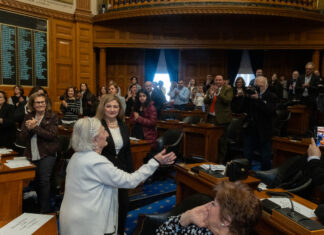By Alin K. Gregorian
Mirror-Spectator Staff
BOSTON — A large and diverse audience gathered at Faneuil Hall on Thursday, October 20, to hear Paul Rusesabagina, the Rwandan activist whose life story was dramatized in the award-winning movie, “Hotel Rwanda,” based on his autobiography, An Ordinary Man.
The lecture was the second K. George and Carolann S. Najarian MD Lecture on Human Rights, an endowed program of the Armenian Heritage Foundation, which is the sponsor of the city’s Armenian Heritage Park, currently under construction.
Charlie Clemens, the executive director of the Carr Center for Human Rights at Harvard Kennedy School of Government, praised Rusesabagina as the “hero of ‘Hotel Rwanda,’ not a label that he has chosen for himself.” He also noted that Rusesabagina has fallen out of favor with the current regime and has incurred the president’s wrath, but is not letting either fact hinder his activism on behalf of the oppressed.
“He continues to do so at great risk to himself,” Clemens said.
Rusesabagina, when he took the stage after thunderous applause and a standing ovation, appeared comfortable and conversational. His hosts’ story was not lost on him and he started by putting the events in Rwanda in context. He said, “We are gathered here to remember a sad story about a genocide — the Armenian Genocide.” During that genocide, he noted, “the whole world was watching and [yet] the world closed its eyes.” He continued that once again, in the 1940s, it happened, this time with the Jews. “It happened again and again.”









